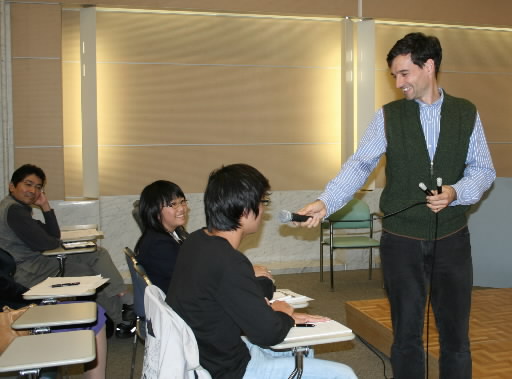American poet Arthur Binard calls idea of A-bombs dropped to end the war “mistaken”
Dec. 3, 2013
American poet Arthur Binard, 46, led a workshop on peace studies at a peace education gathering held at Hiroshima Peace Memorial Museum in Naka Ward. We took part in his “mock lesson,” playing the role of “students.”
Mr. Binard relocated to Japan in 1990, and six years later, at the age of 28, first heard the account of an A-bomb survivor and the word “pikadon.” When he tried using the word himself, it felt unnatural. He explained, “It was because my perspective of the atomic bombing was different from the perspective of the survivors.”
According to Mr. Binard, if you call the atomic bomb a “nuclear weapon,” the event becomes “someone else’s business” from far away in the United States. Calling it an “atomic bomb” puts you in the position of a bystander, watching the mushroom cloud rise from the Enola Gay. And if you call it “pikadon,” you will view the atomic bombing from the ground, like someone who experienced the tragic reality beneath the mushroom cloud.
If you use the word “pikadon,” even if you didn’t actually experience the atomic bombing, it enables you to touch the pain and the sorrow of the atomic bombing, he said. In other words, you can then consider the bombing on a more personal level.
In junior high school and high school in the United States, Mr. Binard was taught: “The atomic bombings helped bring an end to the war.” However, after coming to Japan, he learned that there were two types of A-bombs.
The bomb dropped on Hiroshima used uranium, while the bomb dropped on Nagasaki used plutonium. Uranium can be mined from the ground, but plutonium doesn’t exist in nature and needs significantly more time, and more advanced technology, to be used in making an atomic bomb.
He pointed out that “The United States completed the uranium bomb long before, but didn’t use it. The country waited until the plutonium bomb, which could be produced artificially in large numbers, was developed.” He said that because the plutonium bomb was ready in mid-July 1945, the United States dropped these two types of bombs on Hiroshima and Nagasaki, respectively.
Mr. Binard then concluded: “Therefore, the idea that the atomic bombs were dropped in order to put an early end to the war is mistaken.”
Before, I didn’t think about the difference between the three words that mean “atomic bomb.” From now on, so I can take into account the meaning of words when I use them, I want to deepen my knowledge of nuclear weapons and war. (Shiho Fujii, 12)
If we don’t just swallow everything we’re taught, or read in textbooks, we can consider things more carefully, notice mistaken ideas, and think things through together. I’ll try not to just believe everything I hear. Instead, I want to research these things myself. (Ishin Nakahara, 15)
(Originally published on November 18, 2013)







